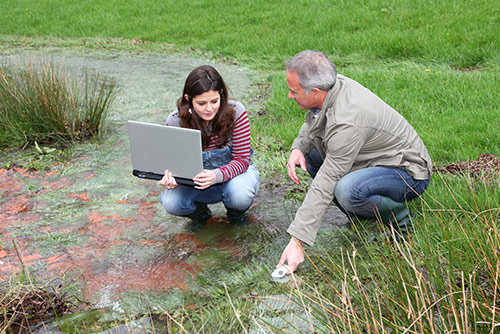
Master of Science in Climate, Energy, and Environmental Sustainability
Lead the charge in making a visible impact on climate change, energy scarcity, and other threats to our environment. Earn your Master of Science in Climate, Energy, and Environmental Sustainability from Johns Hopkins Engineering for Professionals - one of the top graduate online engineering schools in the nation.
Combining Johns Hopkins excellence with online flexibility, you can complete our fully online Climate, Energy, and Environmental Sustainability graduate degree in as few as 2–3 years, at a pace that best fits you - no GRE required.
64%
of JHU Engineering for Professionals master’s alumni report they received a salary increase or promotion after graduation. Add your success to theirs!

This program is ideal for anyone who seeks to transition into or excel in a public or private sector leadership role to ensure an enduring and sustainable future for our planet. Specifically, students who thrive in this program include:
As you progress through JHU’s Climate, Energy, and Environmental Sustainability MS, you’ll focus on the interdisciplinary nature of climate, energy generation/use, and sustainability. By so doing, you’ll prepare to provide solutions to expanding environmental challenges. When you graduate, you can expect to:

Benefit from a rigorous master’s curriculum created and taught by renowned experts in climate, energy, and sustainability. Join a community that includes:
To earn your Master of Science in Climate, Energy, and Environmental Sustainability you must complete 10 courses, five courses from your chosen designated program area and five elective courses from any of the other three program areas. Most students earn the degree in 2-3 years, and you have a maximum of 5 years to complete the program.
Earn your Climate, Energy, and Environmental Sustainability master’s online from JHU and prepare for leadership roles in government agencies, NGOs, or the private sector, including such potential job titles and salaries as:
Median Annual Salary
(National, May 2022)
Median Annual Salary
(National, May 2022)
Median Annual Salary
(National, May 2022)
Source: Bureau of Labor Statistics
As a future environmental engineering leader, you want to make processes more eco-friendly. We aim to provide you with the rich educational experience that makes that possible.
Johns Hopkins Engineering for Professionals offers high-quality online programs tailored to fit your schedule as a working professional. Utilize the full range of JHU services and resources—all available online.
We are committed to providing accessible, affordable, innovative, and relevant education experiences for working adults. Our admissions counselors are standing by to help you navigate your next steps—from application and financial assistance, to enrolling in the program that best fits your goals. Applications are accepted year-round—with no GRE required.
78% of enrolled JHU students’ tuition is paid by employer contribution programs. Ask your employer if you qualify.